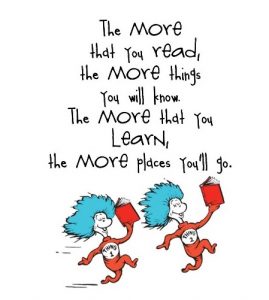Dr. Seuss said, “The more that you read, the more things YOU will know. The more that YOU learn, the more places you’ll go.”
I would add, the more YOU apply what you’ve learned, the further YOU will go. The operative word is “YOU!” Meaning, YOU have to recognize YOU, and YOU alone must become YOUR Own Coach.
It is true knowledge comes from multiple sources [e.g., reading, mentors, coaches, family members], but it is YOUR responsibility to
- Decide what is Valuable and Make it Your Own
- Decide what is Not-Valuable and Ignore
A responsibility that is used to answer both of these decisions is based upon YOUR knowledge gained through reading, learning, and applying this knowledge during YOUR practice or while YOU are playing the game.
Which leads to the important question;
Once YOU have decided what YOU have learned is Valuable, What method of Practice helps YOU make it YOUR OWN quicker?
Practicing it Over-and-Over-and-Over…NOPE
For those of you who are saying, huh; it is my guess you are the ones who misinterpret the story of a phenomenal player who is said to have gotten that way taking 500 swings a week. According to Dr. Christine Carter, Repetition is not the way our brains work – We react to Change. Taking 100 swings a night may create a form of muscle memory [e.g., unconscious process], but that is all it does.
Muscle Memory is one of those “don’t confuse movement with accomplishing anything.”
At best, taking 100 swings a night is a form of learning identified as Habituation. We become a ROBOT and mentally stop responding to what we are being taught, because we somewhat mentally determine it is no longer relevant. Dr. Robert Bjork (PhD, Psychology Stanford) defines the approach of doing the same thing over-and-over again as Block Practicing.
Implementing an Interleaved Practice Helps YOU Apply What YOU have learned
An Interleaved Practice Schedule involves implementing a RANDOM structure to what YOU are trying to improve on. Helping YOU to improve as a HITTER, versus just the muscle memory of a proper swing. Interleaved Practice still requires knowledge from reading, learning, and application, but once you have the knowledge the random practice schedule gives you so much more. In fact Dr. Bjork states, not only will you learn better, but what you have learned will be stay with you [game-after-game-after-game.]
It is worth noting the Random Practice approach may lead to what appears to be a poorer practice performance [e.g., randomness makes it harder], but translates to a superior performance during game time. Think about it, how many times have you said, “I don’t understand why I am not hitting; I took 100 swings at the batting cage before the game today.”
Here’s an approach to try next time YOU Practice Individually.
| Hitting | Fielding | Pitching |
| Take BP swinging at a Fast Ball, Curve, Fast Ball, Change, Fast Ball… | Field a grounder to Your Left, Field a Back-hand, Field a grounder to Your Right, … | Throw a Fastball Inside, Break a Curve to the Outside Corner, Throw a Change on Inside Corner… |
I believe you will find Dr. Robert Bjork’s video very interesting and worth mentally implementing into YOUR Interleaved Practice Approach IMMEDIATELY.
So until next blog, remember what Ben Franklin said,
“Tell me and I forget, teach me and I may remember, involve me and I learn.”
Al McCormick


